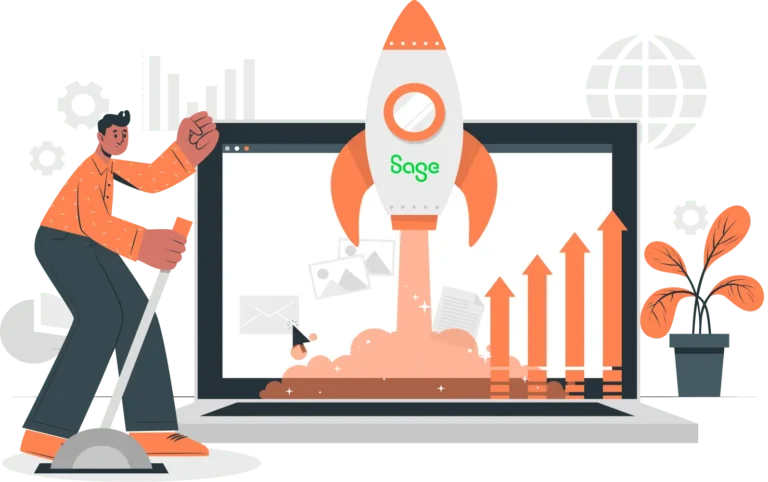
Ask us anything
General FAQs
Is a Closed Source ERP integration more secure than an Open Source ERP integration?
A Closed Source advocate would argue that a single codebase with limited access is more secure, while an Open Source supporter would say their system is less likely to include bugs and have integration issues. However, the reality is that Open Source systems are more secure because bugs are more likely to be identified and fixed and they’re less dependent upon a single person or organization.
How much does your ERP integration cost?
The first step should be free, which is a consultation and demo. The development and support cost will depend on many factors: business size, needs, goals, etc. Discuss the cost after your free demo to ensure it works with your budget.
Do you support legacy Sage software?
Legacy Sage software is older or outdated versions of products that are no longer supported by Sage. We do not offer support for legacy Sage software. However, if you are here for support with legacy Sage software, you could benefit from a Sage Software update. To see if an update is a smart option for your business, reach out to our team for a free demo and consultation. We offer a 24/7 support portal for our clients.
When should I update my Sage software?
Your need to update will depend on the type of Sage Software and your business needs and goals. Some products update automatically, while others have a regular update schedule. Reach out to our team to find out if an update is right for your business.
Where is CertiPro located?
Our headquarters are located in California at 206 N Jackson Street, #304, Glendale, CA, 91206.
How can I book a demo?
Fill out the form on our website: https://certipro.com/contact-us-certipro/
Or call us at: 1-323-316-9777
How much experience with ERP and ERP integration do you have?
CertiPro began as a team of experienced sage software developers in 2012. Since then we have helped multiple businesses develop, implement, integrate, and manage their ERP systems.
How should I manage my eCommerce inventory?
Here are 4 general tips for managing your eCommerce inventory:
- Understand and forecast for demand
- Ensure you have backup/safety stock
- Set a minimum viable stock
- Think about storage
The bottom line: prioritize inventory management.
How can I improve my warehouse inventory management?
Improve automation and integration between your ERP system platforms, and empower your warehouse management with the ability to use the inventory management system effectively. Our Automated Inventory Cycle Counting tool automates the cycle counting process in Sage so you know what’s in your warehouse 24/7/365.
Does CertiPro support cloud-based ERP systems?
Yes, CertiPro supports both cloud and on-premise Sage ERP deployments, providing flexibility based on your business needs.
What industries does CertiPro specialize in?
CertiPro specializes in eCommerce, wholesale, and distribution. However, our products aren’t industry-specific, and we’ve worked with businesses across multiple sectors, as long as they need ERP automation and ERP eCommerce integrations.
Sage Magento Integration FAQs
Does Magento have a new name?
What is Magento used for?
Magento Adobe Commerce is a multi-channel commerce platform for B2B and B2C customers. The platform’s flexibility allows you to manage and scale your entire fulfillment process from inventory to invoicing.
What Sage software do you integrate with Magento?
We integrate Sage 100, Sage 500, Sage X3, and Sage Intacct with Magento Adobe Commerce.
What's the difference between Magento Open Source and Adobe Commerce?
Magento Open Source is a free, open source eCommerce platform. Adobe Commerce is a scaled up version of Magento Open Source with added functionality and features. Either Magento Open Source or Adobe Commerce may be the perfect fit for your business. In addition, our proprietary tools extend the functionality of Magento Open Source to make it a much more robust platform.
Sage WooCommerce Integration FAQs
What is WooCommerce used for?
What Sage software do you integrate with WooCommerce?
We specialize in integrating Sage 100 with the WooCommerce extension for WordPress.
Do you develop or support WordPress websites?
Yes, we develop WooCommerce and WordPress websites. We offer a 24/7 ticketing system for our clients.
Sage Shopify Integration FAQs
What is Shopify used for?
What Sage Software do you integrate with Shopify?
We integrate Sage 100 with Shopify.
Do you develop or support Shopify websites?
We do not provide development, design, or support services for Shopify.
Sage Software FAQs
Which accounting program is better, Sage or Quickbooks?
Do you have experience with Sage Software development?
CertiPro began as a team of experienced sage software developers in 2012. Since then we have helped multiple businesses develop, implement, integrate, and manage their ERP systems.
What Sage ERP Software do you develop?
We provide develop and implementation services for a wide range of Sage Software products: Sage 100, Sage Intacct, Sage X3, Sage 500, Sage CRM, Sage Fixed Assets, Sage Enterprise Intelligence, and nearly any custom Sage software project needed to support your business.
What support do you have for your Sage development?
We offer a 24/7 support portal for our clients on our website – you will receive a confirmation email from your CertiPro team contact. For emergencies, your CertiPro representative will always be available to assist you.
ERP Services FAQs
What is Enterprise Resource Planning (ERP)?
What ERP services do you provide?
CertiPro provides ERP development, support, implementation, and integration services for Sage Software and major eCommerce platforms: Magento, WooCommerce, and Shopify.
What are the types of ERP?
In short, there are three options for ERP systems; Cloud-based, on-premise, and a hybrid of the two. From here, a business can choose from hundreds of types of functions such as finance, supply chain management, and more.
What’s the importance of Enterprise Resource Planning?
Enterprise resource planning software provides integration between business processes in a single-system environment. The ERP application provides users with a single interface to share information and improve collaboration. Overall, ERP increases productivity, communication, and efficiency.

